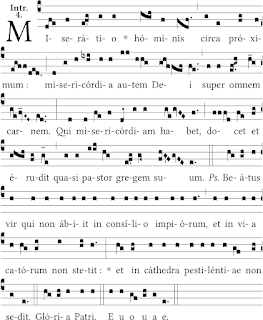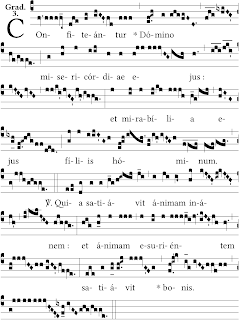But, but... it seems warmer because it is, because I closed the window most of the way last night-- that is bound to have an effect here at my desk, is it not. I could simply erase the beginning of that sentence but I won't, as an exercise in humility; the two or three people who sometimes glance at these pages will smile. Sometimes I'm very unclever, nor do I have the excuse of having just risen from my bed of slumber. It is 41 degrees, or will be as sunrise approaches, in an hour or so.
Today is the feast of Saint John Kanty, priest and Confessor, heavenly patron of Poland and Lituania, of Krakow, and of professors, teachers, and students. I had always figured, wrongly (and in spite of having seen or read the 2nd nocturn lessons at his Matins two or three times), that 'Kanty' was an Anglicised or even Americanised version of the name but Jan Kanty it is. His Office is adorned with three proper hymns, written in the 18th century: Corpus domas ieiuniis at Matins, Te deprecante corporum at Lauds, and at Vespers Gentes Polonae gloria. The Mass is Miseratio hominis circa proximum and, so far as I can tell, it is entirely proper to Saint John i.e. the Introit, Gradual et alii were composed for this particular Mass, presumably or possibly by that same 18th century author. Dom Prosper:
Kenty, the humble village of Silesia which witnessed the birth of St. John, owes its celebrity entirely to him. The canonization of this holy priest, who in the fifteenth century had illustrated the university of Cracow by his virtues and science, was the last hope of expiring Poland. It took place in the year 1767. Two years earlier, it was at the request of this heroic nation that Clement XIII had issued the first decree sanctioning the celebration of the feast of the Sacred Heart...
When enrolling John Cantius among the saints, the magnanimous Pontiff expressed in moving terms the gratitude of the Church towards that unfortunate people; and rendered to it, before shamefully forgetful Europe, supreme homage.
Five years later Poland was dismembered.
The Church is ever saying to thee, and we repeat it with the same unwavering hope: ‘O thou, who didst never refuse assistance to any one, take in hand the cause of thy native kingdom, it is the desire of the Poles, thy fellow-countrymen, it is the prayer of even foreigners.’ The treason of which thy unhappy fatherland was the victim, has not ceased to press heavily upon disorganized Europe. How many other crushing weights have since been thrown into the balance of our Lord’s justice! John, teach us at least not to add thereto our own personal faults. It is by following thee along the path of virtue, that we shall merit to obtain pardon from heaven, and to hasten the hour of great atonements.
Pater Thomas SJ is celebrating this morning's Mass; after he ascends the altar we shall see if in fact it is Saint John's Mass he is saying. Dr Ratovondrahety is seated at the organ. Indeed, Miseratio.
Introitus. Eccli. 18, 12-13. Miserátio hóminis circa próximum: misericórdia autem Dei super omnem carnem. Qui misericórdiam habet, docet et érudit quasi pastor gregem suum. Ps. 1, 1. Beátus vir, qui non ábiit in consílio impiórum, et in via peccatórum non stetit, et in cáthedra pestiléntiæ non sedit. V. Glória Patri.
Collecta. Da, quǽsumus, omnípotens Deus: ut, sancti Joánnis Confessóris exémplo in scientia Sanctórum proficiéntes atque áliis misericórdiam exhibéntes; ejus méritis, indulgéntiam apud te consequámur. Per Dóminum.
Graduale. Ps. 106, 8-9. Confiteántur Dómino misericórdiæ ejus: et mirabília ejus fíliis hóminum. V. Quia satiávit ánimam inánem: et ánimam esuriéntem satiavit bonis.
Allelúja, allelúja. V. Prov. 31, 20. Manum suam apéruit ínopi: et palmas suas exténdit ad páuperem. Allelúja.
+ Sequéntia sancti Evangélii secúndum Lucam. Luc. 12, 35-40. In illo témpore: Dixit Jesus discípulis suis: Sint lumbi vestri præcíncti, et lucérnæ ardéntes in mánibus vestris, et vos símiles homínibus exspectántibus dóminum suum, quando revertátur a núptiis: ut, cum vénerit et pulsáverit, conféstim apériant ei. Beáti servi illi, quos, cum vénerit dóminus, invénerit vigilántes: amen, dico vobis, quod præcínget se, et fáciet illos discúmbere, et tránsiens ministrábit illis. Et si vénerit in secúnda vigília, et si in tértia vigília vénerit, et ita invénerit, beáti sunt servi illi. Hoc autem scitóte, quóniam, si sciret paterfamílias, qua hora fur veníret, vigiláret útique, et non síneret pérfodi domum suam. Et vos estóte paráti, quia, qua hora non putátis. Fílius hóminis véniet.





Comments
Post a Comment